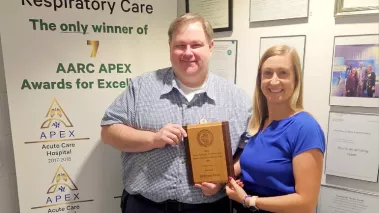A new 175,000-square-foot medical supplies distribution facility is bringing dozens of new jobs to Chicago’s West Side. It's the latest example of how Rush University Medical Center is working to improve public health by improving the economic health of the neighboring communities it serves.
“As an economic anchor on the West Side, how we hire, purchase and invest can have a substantial impact in improving the economic conditions that are directly related to people living longer and better lives,” said Dr. Omar Lateef, the Medical Center's CEO.
Rush partnered with Ohio-based medical supply distributor Concordance Healthcare in 2018 after an upgrade of its supply chain processes and technology meant closing an obsolete warehouse that employed 30 people. Rush sought a supply chain vendor who would agree not only to retain those workers, but also to hire the majority of new employees from the West Side neighborhoods adjacent to Rush. Concordance Healthcare not only agreed to hire the employees from Rush’s warehouse, but they also agreed to build a state-of-the-art distribution facility that serves clients other than Rush and eventually could employ nearly 100 people.
“When we started exploring a relationship with Rush, Concordance immediately felt connected to their mission to heal, but also to the impact of how they hire, purchase, invest and volunteer in their local communities,“ said Todd Howell, Concordance's chief financial officer. “Concordance’s business is built on a foundation of outstanding customers who value local and regional relationships, and we quickly determined that Rush, and other local organizations who share Rush’s mission, are a perfect fit for our company.“
'Dealing our neighborhoods in'
Rush and Concordance leaders recently were joined by Chicago's Deputy Mayor for Economic and Neighborhood Development, Samir Mayekar, and 24th Ward Alderman Michael Scott Jr. to officially open the new facility at 2545 W. 24th St. in the Little Village neighborhood. Scott applauded Concordance’s vision for seeing the site as a place where their business and employees could thrive.
“They saw then what we all can see now,” Smith said, referring to the high-tech facility that keeps Rush running smoothly. “Concordance is a great partner in growth for the 24th Ward.”
Mayekar noted the importance of investments in neighborhoods and the people who live there. “The future of our city and our businesses rests on staying on the cutting edge, and that depends on having a cutting-edge workforce. (This facility) is an example of dealing our neighborhoods in,” he said.
Concordance Health delivers medical and surgical supplies daily to the Medical Center as well as dozens of locations across Rush University System for Health. Rush benefits by turning over its warehouse management to supply chain experts, said Quincy Stanley, associate vice president for supply chain operations. “Concordance will be able to ensure that all of our locations have the product they need when they need it. We’re assured of receiving the best quality, price and value, plus the flexibility to choose the products that work best for us,” Stanley said. He estimates the Concordance partnership will save Rush $1 million a year due to increased efficiency.
Rush Anchor Mission at work
Rush adopted its Anchor Mission Strategy in 2016 after its community health needs assessment showed that there was a 16-year life expectancy gap between Chicago’s Loop and the Garfield Park neighborhood just 4 miles away. “These death gaps are unnatural, unjust and must be addressed by improving the economic conditions in the neighborhoods we serve, not only the health conditions of the people who live there,” Lateef said.
The Anchor Mission Strategy outlines the ways in which Rush can channel economic benefits in how it hires, purchases, invests and volunteers to improve the economic vitality of the West Side neighborhoods Rush serves: North Lawndale, South Lawndale, East Garfield Park, West Garfield Park, Near West Side, Lower West Side, West Town, Humboldt Park and Austin.







